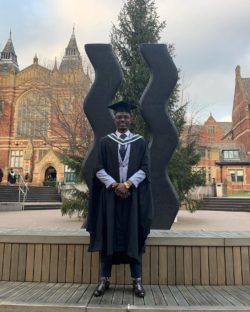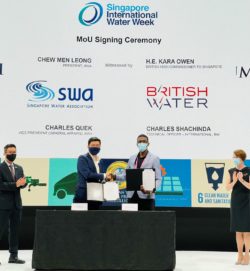Stretching my professional boundaries beyond the WaSH Engineering MSc
This blog is written by Charles Shachinda, Water, Sanitation and Health Engineering MSc alumni and student from the 2020/21 cohort
‘Water is Life’ – as rightly proclaimed – but in essence only when it is clean, safe and readily available for consumption and use. And for quality Water, Sanitation and Hygiene (WaSH) to be delivered to the public, a set of systems, processes and human resources must work interrelatedly.
Arguably, WaSH Engineers save more lives by virtue of being frontliners in safeguarding public health through the provision of WaSH infrastructure and services. Moreover, as access to WaSH is a basic human right and a pre-condition for socio-economic development, regrettably, the WaSH sector remains a considerably highly underserved and underdeveloped sector especially in the global south.
In my country of origin, Zambia, despite being a water sufficient country, it is estimated that 35% of the total population is without access to safe drinking water whereas 68% lacks access to safely managed sanitation at household level. Growing up in my lovely home-town of Mazabuka, water, when judged in terms of utility service supply was, like in many other parts of the country, inadequate and sometimes erratic and of questionable quality. The ‘water problem’ had been a long-standing narrative that kept reinforcing an already deep-sited adverse perception towards utility-supplied drinking water.
After graduating from Civil Engineering school in 2016 and returning to Zambia, I first set off in the private sector for a short stint before joining the local government for about 3 years, delivering predominantly structural engineering related projects in various urban, peri-urban and rural settings. In my extensive local travel, I witnessed first-hand the pressing challenges that many communities, especially in the rural areas faced on a daily basis – ranging from climate-induced water and food insecurity, poor solid waste management practices to suffering diseases due to lack of improved WaSH.

Donning the Leeds MSc(Eng) Graduation Gown on 16th December 2021
Incredibly stunned by how water was inexorably linked to the health and overall development of the people and most importantly the resource being at the heart of their needs; I was convinced to want to become a fully-fledged WaSH specialist to help alleviate pressing WaSH challenges and bridge the large existing inequality gap in accessing WaSH, paying special attention to the needs of the most vulnerable such as children, women and the physically challenged.
Driven by this desire, I enrolled for the Leeds WaSH Engineering MSc and was concurrently awarded the 2020/21 prestigious Beit-Leeds Scholarship to pursue my postgraduate studies in the UK. And as I highly anticipated, the programme catered to my academic needs by opening me up to a dynamic understanding of not only the technical, but also the socio-economic and political factors that influence WaSH in a global context.
It equipped me with the critical know-how to make appropriate use of engineering methods, techniques and tools necessary to plan, design and manage urban and rural water systems – including water supply infrastructure, drinking water treatment and distribution, wastewater collection, treatment, transport and disposal particularly in low to lower-middle and upper-middle income countries.
Generally, my time at UoL can be said to have been nothing short of an enriching and worthwhile experience. As a highly cosmopolitan University, I had the pleasure of meeting peers from all walks of life with whom I forged edifying friendships, in addition to serving as course representative thereby enabling me to regularly interact with staff.
I was equally a member of the Leeds French Society Club which provided me a platform to practise my French from time-to-time, albeit remotely. Further, the course structure facilitated a close interaction and cross-pollination of ideas not only amongst the cohort but also with the WaSH PhD candidates. As a result of this, I participated in writing a collaborative academic work together with two other PhD students and three MSc co-students.
Additionally, the course lecturers were incredible and representative of an international melange. The course leader, Dr Paul Hutchings, and my tutor, Prof. Barbara Evans, did not tire to provide exceptional leadership and the much needed academic and emotional support to propel the cohort amidst the coronavirus pandemic. Their support helped to ease the difficulty and potential impacts on mental health arising from remote learning.
My research project, supervised by Dr Miller Carmago-Valero and supported by Professor Barbara Evans, employed a cost-benefit analysis to evaluate the economic and environmental benefits of treated municipal wastewater use for urban irrigation of Zambia’s staple food crop during the dry season as an integrated water resource management and climate change adaptation measure.
After leaving UoL, I couldn’t be prouder to look back and realise that the skills and experiences I gained from the programme have catapulted me into being part of key water discussions and joining concerted efforts promoting best practise and fostering the continued development of the water industry in the UK and internationally. To this end, I have been fortunate to lead British Water’s business development engagements to a range of international water markets including Brazil, Saudi Arabia, Qatar, India, Singapore and Egypt.

Charles signing a MoU on behalf of British Water with the Singapore Water Association (SWA) at Singapore International Water Week in Singapore that establishes a framework of cooperation in the development of the UK and Singapore water industry ecosystems.
